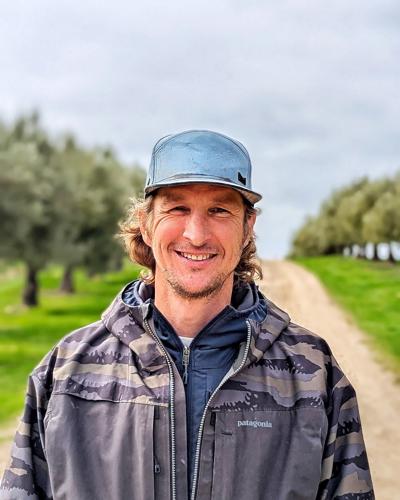
It starts with the crunch of soil under well-worn boots, the scent of morning fog winding through vineyard rows, and the hum of bees over wildflowers. This isn’t just the start of a harvest. It’s the beginning of a revolution—one that’s changing the way California wine is grown, tasted, and experienced by the most discerning palates in the world.
At the center of it all stands Jordan Lonborg, a trailblazer in sustainable viticulture, whose recent move to Coastal Vineyard Care Associates (CVCA) is already rippling through the industry like the swirl of a perfectly poured Pinot.
The Man Who Made Dirt Sexy Again

It’s not every day that a viticulturalist makes headlines. But Jordan Lonborg isn’t just any grape whisperer. He’s the architect behind Tablas Creek Vineyard’s rise as the first Regenerative Organic Certified® (ROC) vineyard in the world. That’s right—the first. While others were clinging to outdated practices, Lonborg was charting a new path, one cover crop and compost pile at a time.
Now, he’s bringing his game-changing expertise to CVCA, a company already known for its elite clientele and bespoke vineyard management. With offices in Napa and Buellton, and vineyards under its care stretching from Paso to the Sonoma coast, CVCA’s decision to create an entirely new role—Regenerative Consultant and Manager of Organic, Biodynamic, and Regenerative Viticulture—signals something seismic.
“We believe organic and regenerative farming is the future of California viticulture,” says Ben Merz, Co-owner of CVCA. “Jordan shares that vision, and together, we’re not just talking sustainability—we’re executing it across thousands of vineyard acres.”
From Groundbreaking to Glass Raising

Lonborg’s mission isn’t about trends or certifications for show. It’s about real transformation—eliminating synthetic herbicides like glyphosate, restoring living soils, and crafting grapes that are not only healthier but more vibrant and expressive.
His resume reads like a sustainability masterclass. From managing 4,000 acres at Monterey Pacific Inc. to redefining excellence at Tablas Creek, Lonborg has always looked deeper than the vine. He understands that great wine starts beneath the surface—with microbiomes, root networks, and an ecosystem that thrives in balance.
“What excites me isn’t just the grapes,” Lonborg shares. “It’s about rebuilding a relationship with the land, honoring the people who work it, and creating a future where farming doesn’t take—it gives back.”
Why Regenerative is the New Sexy
In the world of fine living, exclusivity and elegance often steal the spotlight. But there’s a new layer of desirability unfolding among wine collectors, restaurateurs, and high-end hospitality brands—transparency.
Regenerative viticulture offers exactly that. It’s a return to nature without sacrificing luxury. Think richer, more complex wines that tell a story of how they were farmed—without chemical shortcuts, without compromise.
Instead of monoculture, you get biodiversity. Instead of soil depletion, you get carbon sequestration. Instead of status quo, you get a revolution in every bottle.
And yes, your glass of Syrah just got sexier.
CVCA is Quietly Building the Next Napa Movement

For insiders, Coastal Vineyard Care Associates has long been the secret weapon behind many of California’s most admired wine programs. With bespoke services from vineyard installation to grower relations and grape sales, CVCA is the name whispered in winemaker circles when excellence is non-negotiable.
Now, with Lonborg on the team, CVCA is not just managing vineyards—it’s curating the future of wine. Imagine the next wave of estate wines not just bearing coveted AVAs like Sta. Rita Hills or Oakville, but also certified regenerative status, reflecting care, craft, and consciousness.
Luxury wine, meet long-term sustainability. Finally.
What This Means for Collectors and Connoisseurs
You might be wondering—how does all this dirt talk translate into the bottle? The answer is character. Regeneratively grown grapes yield wines with texture, nuance, and integrity. They speak of the place they come from, of a vineyard alive with pollinators and rich with minerals.
For wine collectors, that means investing in something that transcends taste—it’s about provenance and purpose. For sommeliers and chefs, it offers a pairing partner that aligns with the elevated expectations of today’s fine dining clientele.
And for wine lovers? It means a more meaningful glass. One that tells a story far more compelling than "aged in French oak."
The Future of Wine is Looking Deliciously Responsible

We often talk about the art of winemaking. But what if the true masterpiece is happening in the field—before a single grape is crushed?
Jordan Lonborg and CVCA are proving that excellence and ethics are not opposing forces. They are twin vines twisting together toward something bigger: a wine world that honors tradition, embraces innovation, and gives future generations something more than a legacy of exhausted soils.
If you're a wine enthusiast, a sustainability advocate, or someone who just enjoys a bottle that means something, keep an eye on the labels coming out of CVCA-managed vineyards. They’re not just farming differently. They’re changing the game.






(0) comments
Welcome to the discussion.
Log In
Post a comment as Guest
Keep it Clean. Please avoid obscene, vulgar, lewd, racist or sexually-oriented language.
PLEASE TURN OFF YOUR CAPS LOCK.
Don't Threaten. Threats of harming another person will not be tolerated.
Be Truthful. Don't knowingly lie about anyone or anything.
Be Nice. No racism, sexism or any sort of -ism that is degrading to another person.
Be Proactive. Use the 'Report' link on each comment to let us know of abusive posts.
Share with Us. We'd love to hear eyewitness accounts, the history behind an article.